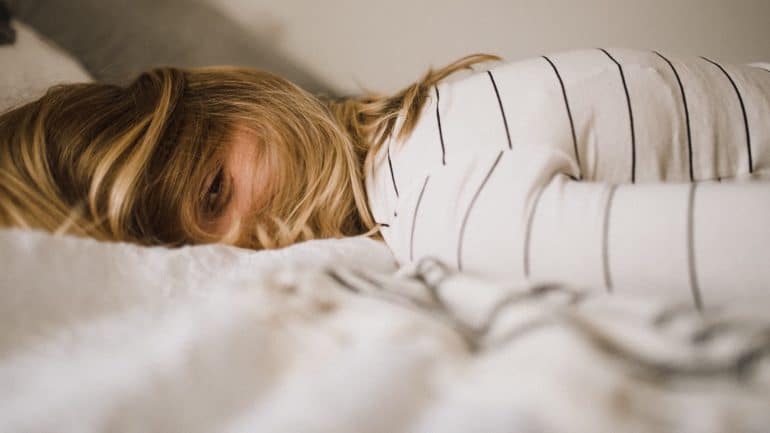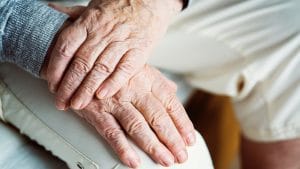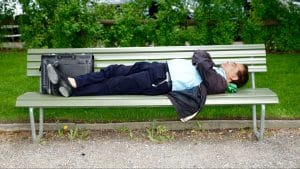What Is Insomnia and How to Defeat It?
written by / June 7, 2021

The luckiest among us fall asleep as soon as their heads hit the pillow. Some people may take 10–20 minutes more, which is ok too. However, more and more people are “hitting a wall” when trying to get some quality shut-eye.
Not only that, but lots of people are waking up throughout the night or early in the morning before reaching the “full” mark on satisfying rest. These are insomniacs—individuals affected by a condition called insomnia.
But what is insomnia exactly? Insomnia is a sleep disorder that can have many causes, two symptoms, and one end result—poor sleep.
This slumber misery can negatively impact every aspect of the lives of those affected and can even make their lives shorter.
But how can we recognize, prevent, and treat insomnia? Find out in the article below.
What Is Insomnia?
Insomnia is a sleeping disorder. The shortest definition describes it as difficulty falling asleep and staying asleep.
Luckily, for many who experience it, insomnia is just a passing difficulty, but it will become a lasting issue for a quarter of those affected.
An average adult needs at least seven hours of sleep per day, and shorter sleep can have serious consequences on health and overall wellbeing.
So how do I know I have insomnia?
In general, these are the signs that should trigger your insomnia alarm:
- If you regularly need more than half an hour to fall asleep
- If you wake up in the middle of the night and are unable to fall back asleep
- If you wake up early even though you’re not properly rested
Types of Insomnia
Insomnia is the most common sleeping disorder. Stats show that about 95% of Americans have experienced at least one episode of insomnia in their lifetime.
There are several forms of insomnia, depending on their causes, symptoms, and duration of insomnia episodes.
Types by Duration
“How long have you been unable to sleep?” This is the first question your physician will ask when you complain of insomnia. The answer is crucial to determine what kind of treatment you should receive and which of the two different types of insomnia you have:
- Acute, short-term, or transient insomnia lasts up to several weeks.
- Chronic or long-term insomnia lasts for over three months, with a frequency of at least three nights per week.
The acute form of insomnia is also called adjustment insomnia and is fairly common. Sometimes it’s even considered a normal reaction to stressful life events such as:
- Having a serious accident
- Losing a loved one
- Becoming a parent
- Starting a new job
- Jet lag
Most of the time, acute insomnia resolves on its own, but it can progress into a chronic problem. That’s why it’s important to recognize it quickly and treat it if necessary.
On the other hand, chronic insomnia doesn’t go away on its own and thus always requires professional treatment. About 10–15% of insomniacs in the US suffer from long-lasting insomnia.
Types by Manifestations
The manifestations of insomnia are also its main symptoms. Since treatment depends on the main symptom of insomnia, this sleep disorder can be classified as:
- Sleep-onset insomnia is when patients struggle to fall asleep.
- Sleep sustaining insomnia (middle insomnia) is when people keep waking up during the night.
- Mixed insomnia is a combination of the two symptoms above, interchanging over time.
Types by Insomnia Causes
Treating insomnia is impossible without understanding its underlying causes. For this purpose, insomniacs are categorized as having:
- Primary insomnia, which can occur for several reasons explained in the three subtypes:
- Idiopathic (insomnia that occurs for no apparent reason)
- Stress-related insomnia
- SSM (sleep state misperception) where people falsely believe they are not getting enough sleep
- Secondary insomnia or comorbid insomnia, which happens as a result of another health condition such as:
- Organic illness
- Mental illness
- Medical treatment for these conditions
Causes of Insomnia
Human sleep is fragile, and the list of triggers for insomnia is very long.
Anything from acute stress to hormonal changes can alter our sleep. So it’s best to leave it to our medical care practitioner to identify the cause.
The diagnosis can be reached by:
- Physical examination
- Any insomnia test or sleep disorder test
- Looking at the patient’s medical history
- Additional organic illness tests
Acute Stress
Stress can alter your sleeping and eating habits. However, once the stress is gone, the sleeplessness that appeared as a result will likely disappear.
These are some examples of acute stress that can cause insomnia:
- Changing seasons
- Jet lag
- Organizing a big event such as a wedding
- Death of a loved one
- Going through a divorce
- Losing a job or changing a job position
Mental Health Problems
So-called comorbid insomnia is associated with an organic or mental disease.
Indeed, many studies prove it—poor mental health and insomnia go hand in hand. They have a bidirectional relationship, which makes it difficult to determine the cause from the consequence.
Some of the main culprits for this type of sleeplessness include:
- Depression
- Anxiety
- PTSD (Post Traumatic Stress Disorder)
Organic Diseases
Insomnia could also be a result of an underlying organic disease.
So in terms of health conditions, what causes insomnia?
- Chronic diseases that are painful such as arthritis, fibromyalgia, and cancer
- Health conditions that result in a hormonal imbalance such as hyperthyroidism and Cushing syndrome
- Neurological diseases such as Parkinson’s disease and Alzheimer’s disease
- Cardiovascular diseases such as heart failure and arrhythmias
- COVID-19
- Gastroesophageal reflux
- Other sleep disorders such as sleep apnea, restless leg syndrome, etc.
Medication
Insomnia-inducing medications are used to treat many health conditions. So if the onset of your insomnia symptoms coincides with starting a new prescription drug, you should probably look into it.
These are some of the medication types that can cause insomnia:
- Sedatives
- Antidepressants
- Blood pressure medications
- Corticosteroids
- Nasal decongestants
- Oral decongestants
- ADHD medication
- Beta-blockers
- Asthma medication
- Medication for Alzheimer’s disease
- Substitutes for nicotine
- Anticonvulsants
Other Common Causes of Insomnia
This category contains environmental, personal, and other reasons for insomnia such as:
- The comfiness of your mattress, bed, or bed frame
- Noise, ambient temperature, and humidity
- Sleep hygiene
- Eating habits
- Lifestyle choices such as smoking or drinking coffee or alcohol
- Work schedule
- Negative thinking patterns or constant worrying
Risk Factors
Insomnia is very common. According to one sleep model statistic, one in three Americans suffers from insomnia.
That said, not everyone has the same risk of developing it. The complete list of insomnia risk factors is long, including things like lifestyle, job position, and outlook on life.
While we have control over some of these, there are other risk factors that we can’t change. These include age, race, and genetic predisposition.
So who suffers from insomnia? The breakdown of risk factors below will give you the answer.
Seniors
It’s a well-known fact that insomnia rates increase with age. Studies have found that people over 65 are 1.5 times more likely to have sleep problems than younger people.
This can be caused by an increase in chronic conditions or the natural shift and changes of sleep parameters as we age.
For example, bladder issues are quite common among seniors, especially men. Consequently, waking up to urinate during the night is one of the main causes of insomnia in males.
In addition, the quality of sleep deteriorates in older people, and there is a reduction in slow-wave sleep (SWS). As a result, the sleep-wake cycle also changes. Typically, this means going to bed earlier and waking up earlier.
However, this doesn’t necessarily result in insomnia.
Women
According to the results from the sleeping model discussed above, women are about 1.3 times more likely to become insomniacs than men.
Why is that? What causes insomnia in females?
- Fluctuating hormones
Hormones are in charge of all bodily processes. Both sexes have them, but they fluctuate more in women. Changes in hormone levels that occur monthly, when pregnant, and during menopause can cause insomnia.
- Mental load
In today’s (still) patriarchal society, the mental load mainly falls on women’s shoulders. This means that women are typically in charge of organizing the household. Having too many tasks to organize and worry about can steal women’s well-earned z’s.
- Mood disorders
What is insomnia, if not the most common manifestation of a mental health issue? Women are twice as likely as men to be diagnosed with mental disorders, according to recent statistics.
- Parenting
Women typically have more day-to-day parenting responsibilities than men. This can lead to emotional and physical exhaustion and insomnia.
COVID-19 Survivors
Regardless of the severity of their illness, some patients experience long-lasting effects of the disease even after recovering.
Besides the typical COVID-19 symptoms, insomnia, anxiety, and fear of falling asleep are common among people who have recovered from the disease.
What’s more, the treatment of coronavirus-induced insomnia is tricky since the reasons behind why it happens are not yet fully understood.
Chronic Disease Patients
Any chronic illness, especially a painful one, can lead to difficulty dozing off. In addition, some medications that treat chronic diseases can influence your sleep as well. That’s why it’s important to talk to your doctor as soon as you feel the onset of insomnia.
People with Mental Disorders
Insomnia is part of the clinical picture for many mental illnesses. Therefore, for these patients, treating and stabilizing their mental condition can also mean alleviating their insomnia.
Racial Minorities
Unfortunately, there are still many social and healthcare disparities between Caucasians and racial minorities. Consequently, this leads to a higher incidence of insomnia among people of color.
For example, African Americans are more likely to suffer from shift work sleep disorders. They also face higher stress levels because of racial discrimination. One aspect of this discrimination is that people of color wait longer for diagnosis and treatment of their acute or severe chronic insomnia because they have trouble getting quality medical care.
The Stressed Out
Being under a lot of stress can increase your chances of developing insomnia. Stress can have multiple causes, including:
Work-Related Stress
- A hectic work schedule
- A stressful work environment
- Conflicts with co-workers and managers
- Dissatisfaction with work activities or position
Stress-Inducing Thinking Patterns
Negative and repetitive thoughts may make you lose sleep. While they are rarely the cause of sleep maintenance insomnia, they do delay the onset of sleep. Some examples of negative thought patterns are:
- Unrealistic expectations for sleep duration
- OCD
- Catastrophizing
- Overgeneralization
- Selective attention
- Lack of optimism
- Low self-esteem
People with Certain Lifestyle Choices
Your lifestyle can influence your sleep in more ways than one. Knowing this can help you combat insomnia without paying for medication or alternative treatments.
Eating and Drinking Habits That Affect Sleep
- Eating spicy, high-calorie foods before going to bed
- Drinking coffee, alcohol, energy drinks, and even too much water before bedtime
- Smoking cigarettes
Poor Sleep Hygiene
- Chronic insomnia treatment may include following a strict schedule for going to bed and waking up during the week, which are basic to maintaining good sleep hygiene.
Other Sleep-Killing Behaviors and Habits
- Using your mobile phone, working on a computer, or watching TV before going to bed
- Exercising or doing other stimulating activities right before bedtime
The Genetically Predisposed
A recent study confirms what scientists have long suspected—insomnia can be hereditary. That said, genes are not enough to cause insomnia. They have to be triggered by external factors.
Symptoms of Insomnia
The most common complaints of patients who have insomnia are:
- Difficulty falling asleep at night
- Waking up during the night, once or multiple times
- Waking up too early
- Daytime sleepiness
- Fatigue
- Low blood pressure
- Mood troubles such as irritability, depression, anxiety
- Cognitive disorders such as hyperactivity, reduced memory, and lack of focus
- Falling asleep behind the wheel
- Digestion issues
- Headaches
- Hallucinations (only in extreme insomnia cases)
Consequences of Insomnia
If left untreated, insomnia can have some of these negative effects:
- Mental and physical exhaustion
- Low professional performance
- Social isolation
- Higher risk of motor vehicle accidents
- Mental health disorders
- Substance abuse
- Hypertension
- Heart conditions such as arrhythmias and heart failure
- Asthma, COPD, and other respiratory conditions
- Increased susceptibility to infection
- Developing fibromyalgia or another kind of chronic pain
- Weight gain
- Metabolic syndrome
Prevention
Understanding exactly what is insomnia and what causes it is indispensable for proper preventive actions.
But since many things may affect the quality of your sleep, preventing insomnia primarily means taking good care of your general physical and mental health.
That said, there are some everyday steps you can undertake to avoid falling into the hands of sleeplessness:
- Make sure you sleep on a good-quality bed or sleeper sofa
- Wake up and go to sleep at the same time every day
- Don’t eat spicy and fatty foods or large meals before going to bed
- Be physically active every day
- Try some home remedies for insomnia, such as breathing exercises
- Limit napping time
- Turn off electric devices such as TV, phone, and laptop at least one hour before going to bed
- Take your pain medication regularly
- Treat specific pain with specialized pillows such as pillows for neck pain
- Practice relaxing techniques
- Don’t use your bed for activities other than sleeping and sex
- Consult a therapist if you have negative or repetitive thoughts
- Limit the consumption of coffee and other stimulants
- Don’t drink alcohol
- Stop smoking
As you’ll see below, preventive measures can sometimes coincide with natural remedies for insomnia.
Treatment
Specific treatment is not necessary for every type of insomnia. More precisely, acute insomnia tends to resolve on its own. Nevertheless, you should take action if you experience persistent sleep trouble which continues for more than a month.
When treating insomnia, a physician’s main task is to identify what is causing it. Then, depending on the type of insomnia, they should decide what type of treatment is best suited and whether the use of medication is indicated or not.
Types of Insomnia Treatments
Non-Drug Insomnia Treatments
- Cognitive Behavioral Therapy (CBT) is a psychotherapeutic approach. CBT is an effective treatment for anxiety, depression, and stress-related insomnia. One of its major benefits is that it doesn’t have any side effects.
- Relaxation techniques Breathing exercises, yoga, and meditation can help your body and mind relax and prepare for sleep.
- Relaxation treatments Acupuncture or massage can relieve pain and help you relax.
- Regular exercise Exercise is important, but be careful not to do it too close to bedtime.
- Changes in sleeping habits Good sleep hygiene is important to anyone struggling to figure out how to cure insomnia. It includes turning off any electronic devices at least an hour before bedtime, avoiding certain foods and drinks in the evening, and keeping naps short.
- Changing dietary habits Paying attention to what and when we eat and drink falls into this category.
- Devices for insomnia Gadgets such as blue-light filtering glasses or white noise machines can help us fall asleep faster.
- Create a soothing sleep environment Eliminating noise, turning off lights, and covering up with a good-quality weighted blanket can all improve your sleep environment and your sleep.
You can find more useful tips and tricks in our article on a healthy sleep environment.
So now you know how to treat insomnia naturally without medication.
Over-the-Counter Insomnia Remedies
Some over-the-counter medications can have sleep-inducing effects. These include:
- Herbal products such as those containing extracts from chamomile, valerian, or kava
- Melatonin supplements contain a hormone that has a role in the regulation of the sleep-wake cycle
- Antihistamines such as diphenhydramine and doxylamine
- Cannabidiol (CBD) oil and other food or drinks that contain CBD
Prescribed Medications for Insomnia
So-called sleeping pills are generally reserved to treat severe forms of insomnia, regardless of the duration. Doctors are generally careful about prescribing these for long-term use since most of them can have negative side effects.
There are plenty of medications commonly used for chronic insomnia treatment, and they can be divided into these pharmaceutical groups:
- Benzodiazepines
- Histamine-receptor blockers
- Antidepressants
- Melatonin receptor agonists
- Orexin receptor antagonists
Conclusion
Although things might feel scary when sleep slips away from us, there are plenty of solutions to the problem. Finding the right one is a bit trickier. That’s why we made a concise list of the most probable causes.
Understanding what is insomnia makes the fight easier, or better said, it makes it easier to let go and get some sleep. So educate yourself and take action before it’s too late.
FAQs
What is primary insomnia?
Primary insomnia is insomnia whose cause isn’t obvious. It’s usually triggered by acute stress, discomfort, or an altered perception of sleep (sleep state misperception or SSM). Unlike secondary insomnia, primary insomnia isn’t caused by any underlying disease.
What is chronic insomnia?
Insomnia that lasts longer than three months and occurs more than three nights per week is considered chronic.
Chronic sleeplessness requires medical treatment, and more severe forms require prescription medication.
What are the 3 types of insomnia?
- Sleep-onset insomnia happens when people can’t fall asleep in 30 minutes
- Sleep sustaining insomnia is also referred to as middle-of-the-night insomnia. People who suffer from this type of insomnia may fall asleep fast but wake up during the night
- Mixed insomnia is when both falling and staying asleep are problematic
What happens during insomnia?
Insomnia leads to excessive daytime sleepiness, which directly impacts a person’s ability to drive or operate machinery and also reduces mental and memory functions.
Suffering from sleep deprivation affects a person’s mood and can trigger anxiety and depression. Insomnia can also aggravate an underlying disease.
Here are some facts about lack of sleep:
- Going 17 hours without sleep is equivalent to having a 0.5 blood alcohol content
- Insomnia increases appetite by 25%
- 1/5 of road accidents are linked to chronic insomnia
How do I get rid of sleepless nights?
- Identify what’s causing your insomnia
- Change your before-bed habits, such as watching TV or using another blue-light emitting device
- Don’t overeat or eat spicy foods before going to bed
- Avoid caffeine and alcohol consumption in the evening
- Check the possible side effects of any medication that you’re taking
- Undergo medical tests to exclude any underlying cause
- Sleep in a dark and quiet environment
- Exercise regularly
- Practice relaxing techniques such as meditation, yoga, etc.
- Quit smoking
Can you die from insomnia?
There’s only one type of insomnia that is deadly, and that is fatal familial insomnia, which is actually a degenerative brain disease.
If you’re not suffering from it, you have nothing to worry about! There’s zero evidence that insomnia can kill you. Moreover, the world record for staying awake is eleven days!
That said, insomnia increases your risk of heart disease, hypertension, and respiratory infections.
Can insomnia be cured permanently?
Fortunately, yes! Insomnia can be cured if the underlying cause is properly diagnosed. In the best-case scenario, you’ll just have to change the medications you’re taking.
Another option is making some lifestyle changes, which can be pretty hard. Also, if psychological issues are what’s keeping you from getting a good night’s sleep, then there’s hard work in front of you.
That said, going to therapy, doing relaxation exercises, and practicing cognitive-behavioral therapy can help you restore your sleep.
Other therapies include sleeping pills, electrostatic stimulation, or over-the-counter remedies.
What foods cause insomnia?
There are a few foods that can keep you from falling asleep:
- Red meat Foods that are high in fat and protein are more difficult to digest, so they can keep you awake.
- Spicy foods Whether it’s a super-hot curry or a spicy chili sauce, these foods may cause indigestion and increase body temperature. Therefore, they can disrupt sleep.
- Fried foods French fries, eggs, and everything else deliciously fried in a pan should be removed from your menu in the evening if you want to fall asleep quickly.
- Chocolate and other cocoa products Besides caffeine, chocolate contains other stimulants, including tyrosine and theobromine. These amino acids can cause an increased heart rate.
- Tomatoes Tomatoes are acidic, which again affects digestion, making it hard to sleep.
- Salads Their high water content will likely lead to several night-time trips to the bathroom, which will disturb your sleep.
Can insomnia go away on its own?
The acute form of insomnia can disappear on its own. After the initial shock, your body and mind will adapt to whatever change you might be going through, and you’ll be able to doze off again.
For the chronic type of insomnia, you’ll need to identify the culprit and take adequate steps to eliminate it. This typically includes seeking medical advice.
Educating yourself on what is insomnia can help you identify it more easily and start treating it quickly.









Warning: Undefined array key "format" in /home/602518.cloudwaysapps.com/cspedpjass/public_html/wp-content/themes/disturbmenot/template-parts/post-item/post-comment.php on line 23
Warning: Undefined variable $commenter in /home/602518.cloudwaysapps.com/cspedpjass/public_html/wp-content/themes/disturbmenot/template-parts/post-item/post-comment.php on line 27
Warning: Trying to access array offset on value of type null in /home/602518.cloudwaysapps.com/cspedpjass/public_html/wp-content/themes/disturbmenot/template-parts/post-item/post-comment.php on line 27
Warning: Undefined variable $commenter in /home/602518.cloudwaysapps.com/cspedpjass/public_html/wp-content/themes/disturbmenot/template-parts/post-item/post-comment.php on line 29
Warning: Trying to access array offset on value of type null in /home/602518.cloudwaysapps.com/cspedpjass/public_html/wp-content/themes/disturbmenot/template-parts/post-item/post-comment.php on line 29